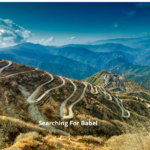The Music of Halacha: Shabbat 14: Things II
How To Make a Blessing
Yes, this is about Muktzah, but we must first take a slight detour. (I am trying to emulate my father zt”l) Actually we are studying our relationship with our things.
Introduction
I once told one of my children how much I loved her art project. She thought seriously for a few moments before asking me whether I loved her project more or less than I loved her! We take our words for granted, but the truth is clearer to an innocent child.
“I love my new dress.” “I love my car!” “I love your cooking.” “I love you.” How strange! We describe our feelings about our things with the same words we use to describe our most important relationships. I have often been told that Eskimos have tens of words to describe snow, which is such an important part of their lives. Yet, we seem short on words to describe this most powerful and important emotion. We have a relationship with our things. We love some of them and hate others as in “I hate this dress!” No matter how we feel about our things, the fact is that we do feel. We have a relationship with them.
The previous Music of Halacha focused on appreciation of what we have, more specifically, our awareness that our things are gifts from the Almighty. My father had such a deep appreciation of his 1952 Army Surplus Chrysler being God’s gift to him, that he refused to hear any criticism of the holes in the floor, the absence of seat belts, or any heating for that matter. He took each complaint about his car as a personal insult. He drove the car back and forth to New York from Baltimore on a regular basis, and blamed his children’s criticisms of the car for her long delayed demise. (The tow truck driver actually asked him how many years the car had been sitting on the side of the road. He refused to believe that the car had recently been alive!) The car ran on my father’s conviction that his car was a gift from God.
As anyone will tell you, I am not my father, but Halacha pushes us to develop a deeper awareness of our relationship with our things. The laws of Muktzah, what we may and may not move on Shabbat, are a superb lesson in how to relate to our things.
I. Blessings
The Zohar teaches that a blessing does not begin with the word “Baruch” – “Blessed” – it begins with the way we hold the food we are about to eat. We must choose the best apple of the bunch before reciting the blessing. We are taught to pick up the apple and focus on it before reciting the blessing. We begin the process of making the apple ours when we designate it as something over which we are about to recite a blessing. Once we have designated the apple we should not switch it even for a better or even wormhole free apple. We established a relationship with this specific apple. It has changed through our designation of it as one we are about to bless.
The Zohar and Halacha teach us that we should know how we are about to use our things before we use them. This awareness will increase our appreciation of the clock that wakes us each morning, the car we drive, the pots we use and the floor we abuse and are about to clean.
My car has carried me for more than 70,000 miles. It has driven through snow, ice and rain. It absorbs the bumps and holes of the road, and all it asks is some gas and oil every once in a while. The car does so much for me. It deserves some acknowledgement and gratitude. It takes me to synagogue, to classes, to visit my children, to weddings and funerals. It does so much for me. It even keeps Shabbat. It doesn’t drive on Shabbat or Jewish Holidays, except for a bunch of emergency trips to the hospital. I may not lend her out to someone to drive on Shabbat. If I had horses, I wouldn’t, couldn’t use them to work on Shabbat. My horses must rest on Shabbat. Halacha treats my relationship with my car and imaginary horses very seriously.
II. Muktzah (Finally!)
Unrestricted freedom to handle any sort of object or tool not designated for any Shabbat needs could lead someone to impulsively make a quick repair before realizing his transgression. (Maimonides, Laws of Shabbat 25:13)
We take our things for granted. We use them without thinking. We use them impulsively. The laws of Muktzah remind us, one day each week, to pause before we pick up one of our things and consider how we are about to use it. Do we need it for Shabbat? Do we intend to use it for something permissible on Shabbat?
Muktzah begins when we learn to stop before we use our things and think about how we are about to use them.
I urge you to try it!
To be continued…



